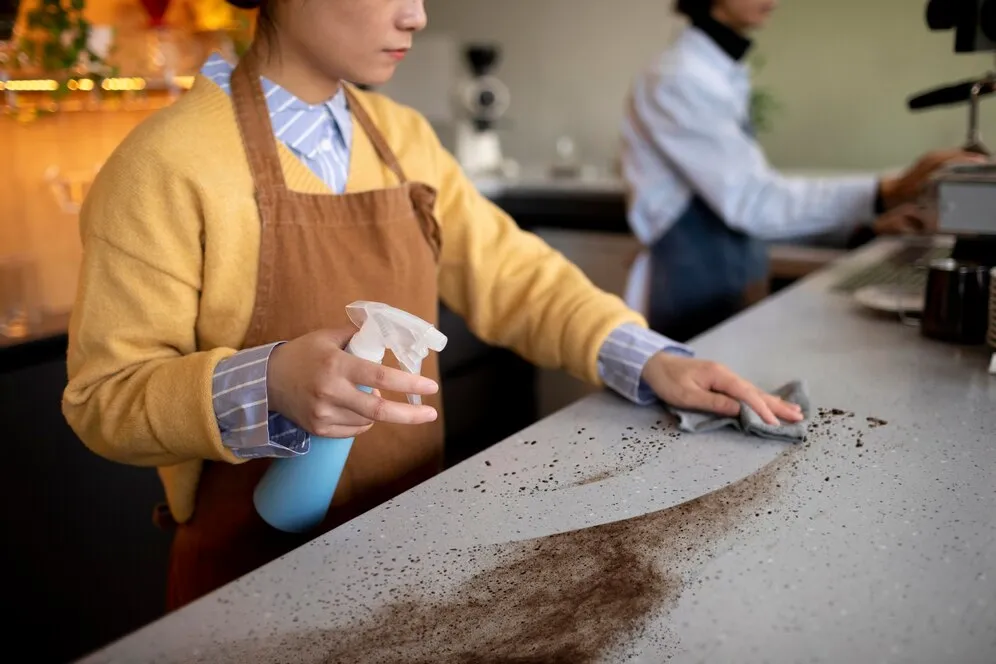Countertops are an essential part of any kitchen or bathroom, but over time, they can develop scratches and stains due to daily wear and tear. Whether you have granite, quartz, laminate, or marble countertops, learning how to repair scratches and stains on your countertops is key to maintaining their beauty and durability. In this guide, we’ll cover DIY countertop repair methods, stain removal techniques, and professional restoration tips to keep your surfaces looking as good as new. Contact for Professional Guides.
Understanding Countertop Damage: Scratches vs. Stains
Before diving into repair methods, it’s important to distinguish between scratches and stains:
- Scratches: Caused by sharp objects, rough cleaning materials, or general use.
- Stains: Result from spills, acidic substances, or heat exposure.
Each type of damage requires a different approach to restoration. Let’s explore the best ways to fix these common issues.

How to Fix Scratches on Countertops
The repair method depends on the countertop material and the depth of the scratch.
1. Repairing Light Scratches
For minor surface scratches on granite, quartz, and laminate countertops, follow these steps:
Clean the surface: using a damp microfiber cloth and mild soap.
Buff out scratches: with a sanding pad (fine-grit) in circular motions.
Apply a countertop polish: to restore shine and protect the surface.
Use a countertop sealant: for added protection on stone surfaces.
2. Fixing Deep Scratches
For deeper scratches on marble, granite, or solid surface materials, use these techniques:
Epoxy resin: Fill the scratch with a color-matching epoxy resin and smooth it with a putty knife.
Professional countertop repair kits: These include sealants and buffing pads for deep scratch restoration.
Sanding method: Lightly sand the area with 400–600 grit sandpaper, then polish it for a smooth finish.
How to Remove Stains from Countertops
Different stains require different removal methods. Here’s how to remove stains from common countertop materials:
1. Removing Stains from Granite and Quartz
Baking Soda Paste: Mix baking soda with water to form a paste, apply it to the stain, let it sit for 24 hours, and wipe clean.
Hydrogen Peroxide: For tough stains, use a hydrogen peroxide solution and rinse thoroughly.
Sealing Granite Countertops: Always reseal your granite after stain removal to prevent future damage.
2. Cleaning Stains on Laminate and Solid Surface Countertops
Vinegar Solution: Mix equal parts vinegar and water, apply with a microfiber cloth, and wipe away stains.
Surface Refinishing Kits: Available for laminate surfaces to remove deep stains and restore shine.
3. Removing Water and Heat Stains from Marble Countertops
Poultice Method: Mix baking soda with water, apply to the stain, cover with plastic wrap, and let it sit overnight.
Polishing Marble: After stain removal, use a marble polish to maintain a glossy finish.
Preventing Future Scratches and Stains
To avoid frequent countertop damage, follow these kitchen maintenance tips:
Use cutting boards instead of cutting directly on countertops.
Wipe spills immediately to prevent stains, especially on porous surfaces like marble.
Apply a countertop sealant every 6-12 months to protect natural stone surfaces.
Use soft microfiber cloths for cleaning instead of abrasive pads.
When to Call a Professional for Countertop Repair
If DIY solutions don’t work, or the damage is extensive, consider hiring a professional countertop repair service. Experts can:
Perform deep scratch removal using industrial tools.
Offer countertop refinishing kits for a complete restoration.
Apply solid surface material restoration for seamless repairs.
Conclusion
Restoring kitchen countertops doesn’t have to be a challenge. By following these DIY methods and professional countertop repair techniques, you can effectively fix scratches and stains, prolonging the life of your surfaces. Whether you’re dealing with quartz, granite, laminate, or marble countertops, regular maintenance and the right repair approach will keep them looking brand new.
For deeper damage, consider countertop refinishing products or professional repair services to ensure long-term durability.

